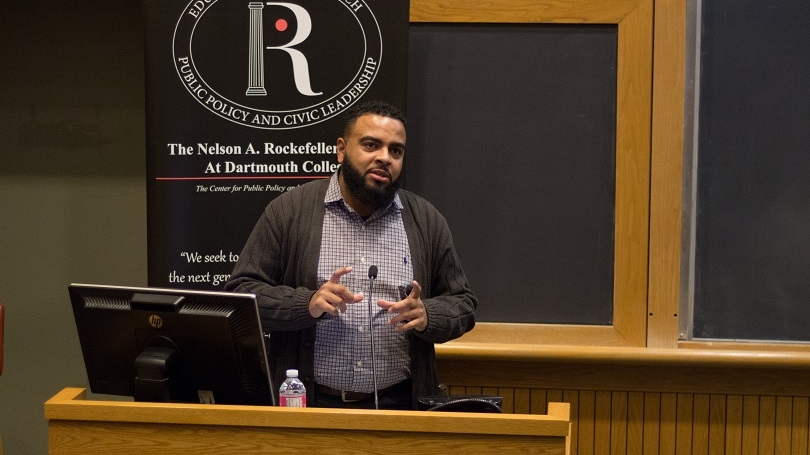
- Public Policy
- Leadership
- Funding
- News & Events
- About the Center
Back to Top Nav
Back to Top Nav
Back to Top Nav
Back to Top Nav
On Tuesday, January 22, 2019, human-centered designer and community organizer Chris Rudd spoke at the Nelson A. Rockefeller Center, delivering a lecture and presentation on the intersection between design and juvenile justice reform. The founder of ChiByDesign, a Chicago-based human-centered design firm, Rudd said he aims to see and shape a better world.
Rudd’s interest in social justice began with his parents’ activism. “I grew up going to picket lines and strikes,” he said. “The Midwest is a big union place, so that was always a big cause in my family.” He added that he took on his own causes as a teenager, especially at his school. “Having to fight for better education, fight for better access, [and] organizing with [his] classmates” shaped his youth.
His work in juvenile justice began at the Mikva Challenge, where he headed a juvenile justice council made up of local students that was focused on reforming the system in Cook County. The problems, Rudd said, are “mostly centered around racism.”
“[Schools] target and discipline black and brown youth at just a ridiculous rate,” he pointed out. “The goal has always been to correct, if not replace, the institutions that aren’t doing the right thing…. Design,” he added, “is rooted in correcting problematic things.”
At the Mikva Challenge, Rudd’s team focused on the barrier to re-entry into society that having a “rap sheet,” a juvenile criminal record, represents. “That rap sheet can prevent you from going to college, getting employment, housing, a slew of things,” he said.
The expungement process, by which individuals can erase their criminal records and start with a clean slate, “was not being used by most young people,” Rudd said. “At that time in 2013, there were 25,000 [juvenile] arrests in the city of Chicago, 70 applications for expungement, and 70 successful expungements. A hundred percent success rate,” he pointed out, “but no one is using it.”
To help young people interested in expungement learn about and navigate the process, Rudd’s team created an online app called “Expunge.io.” The simple app determines if users have a “rap sheet” and, if yes, connects them with pro bono lawyers that can help them. “The way the process was set up, it’s almost impossible for an adult to navigate the system by themselves, let alone someone under eighteen,” he said. “We felt that it was necessary that they have an advocate – a lawyer – in court to help them fill out the application and go in front of the judge.”
Another obstacle they found was actually acquiring a physical copy of the “rap sheet,” which was only available at police headquarters at the time. Rudd and his team successfully convinced the police department to put a new fingerprint terminal into the juvenile court – a location youth offenders would be visiting anyway – which allowed far more people to finish the expungement process.
Rudd said that the open-source app has since been replicated in four other states: California, Pennsylvania, Maryland and Louisiana. He hopes that it is expanded further. “I know that there are young people around the country that need tools like this to deal with the situations that they’re in,” he said.
Afterwards, Rudd studied design for a year at Stanford’s d.school, then returned to Chicago, where he now heads ChiByDesign. He started the firm in order to provide a new player in the design world that is not “very male, and very white.” At ChiByDesign, Rudd said, “75% of people I work with are people of color at all times, and 50% are women, because I just don’t believe we can design a new world without a plethora of inputs.”
He added that this diversity helps ChiByDesign identify solutions that already exist in the community, rather than taking top-down, external approaches that he says are less helpful. “I’m always looking for ways to galvanize people to use their brilliance to make [the world] better, make [the world] different.”
Submitted by Kyle Mullins '22, Rockefeller Center Student Program Assistant for Public Programs
The views and opinions expressed and any materials presented during a public program are the speaker’s own and do not necessarily represent the views and opinions of the Rockefeller Center or constitute an endorsement by the Center.